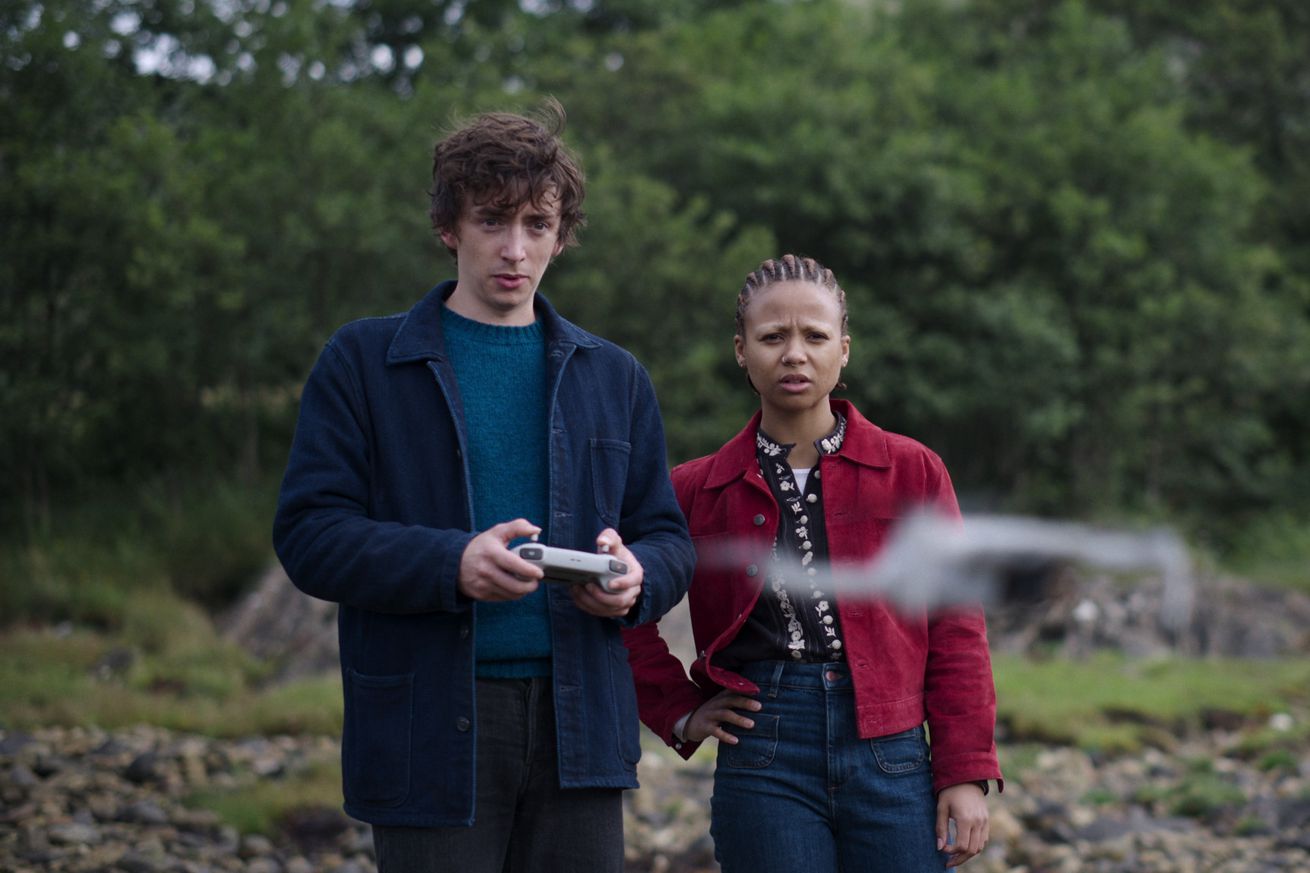
Black Mirror’s ‘Loch Henry’ can’t decide whether to indulge in true crime or critique it
Black Mirror is known as a series about the dangers of technology, but it’s often more specifically about the corrupting influence of entertainment. Spectatorship makes us cruel, the show suggests over and over, turning other humans’ real pain into fodder for our own amusement. The sixth season episode “Loch Henry” fits into this dynamic but in a way that feels surprisingly anemic, neither exploring the potential ugliness of its premise nor developing characters who transcend it.
At the beginning of “Loch Henry,” Davis (Samuel Blenkin) is a film student returning home with his girlfriend Pia (Myha’la Herrold). It’s supposed to be a brief stopover; they’re planning, to the bemusement of everyone but Davis, a documentary about a man who guards eggs from poachers. Then Pia discovers the nigh-deserted town was the home of a serial killer named Iain Adair. It’s an opportunity to make a film people will actually watch, perhaps on the lucrative video platform Streamberry, known for its wealth of true crime shows. And Adair’s crimes were indirectly uncovered by Davis’ father, a local police officer — so there’s a personal angle to sell.
The thing is, even fans of true crime acknowledge it’s a morally fraught pastime. And “Loch Henry,” directed by Sam Miller and written by series creator Charlie Brooker, makes fairly mild observations about the genre’s ugly side. Davis is troubled by the prospect of exploiting his family’s trauma for content, even though his hometown friend Stuart (Daniel Portman) — a bartender who cracks jokes about pronouns and “diversity” — hopes it will revitalize the local economy. A potential producer pushes the team into gathering new footage, nudging them toward the outer boundaries of ethical documentary work. There’s a glaring gap between everyone’s pronouncements of sympathy and sensitivity and the shots of lurid tabloid headlines. But then it turns out that the mystery might not be as solved as everyone expected… and…
Unfortunately, the truth isn’t all that compelling. Black Mirror is capable of engendering real horror and disgust — “White Bear,” for instance, features a twist that’s more effectively awful than Adair’s over-the-top crimes. But “Loch Henry” resists telling a good fictionalized crime story. While the episode makes nice use of grainy mockumentary clips for flashbacks, Adair’s murders are broadly sketched and generic thrill-kills that are neither seriously horrifying nor played well for dark comedy. (One character compares the events to a nonexistent documentary called The Waltonville Claw, but at least that killer apparently ate the victim’s eyes in front of them, so he’s got what an industry exec might call a “hook.”) The modern-day mystery, meanwhile, is introduced late and rushed toward a conclusion that seems deliberately unsatisfying.
At the same time, “Loch Henry” devotes more time to the murders than to satirizing the media circus around them. A montage highlights the tonal dissonance between the grim subject matter and Davis and Pia’s overall lightheartedness, as well as some jabs at the business of finding a “fresh angle” on tragedy. We get a nod to the way streaming platforms rapidly repackage every crime documentary into a drama. But the town’s plight is less fleshed out and surreal than many real-life comparison points. (Last year’s killings in Moscow, Idaho, resulted in a professor being falsely accused by a TikTok influencer who “solved” the murders using tarot cards, which is a more biting indictment of crime fandom than anything in “Loch Henry.”) The episode is ultimately about Davis’ own familial drama, but he’s not a strong enough presence in the story to make that conflict land.
The best part of “Loch Henry” ends up being Davis’ relationship with Stuart and his friend’s ailing father, a man who not only remembers the murders, but may know more about them than he lets on. Their scenes hint at a script that’s legitimately interested in its central subject: a village where an older generation of upstanding citizens keep each other’s sordid secrets, while a younger one will do anything to give their town a future. But telling that story would require indulging the lowbrow voyeurism Black Mirror critiques — the results might even be fit for Streamberry.

